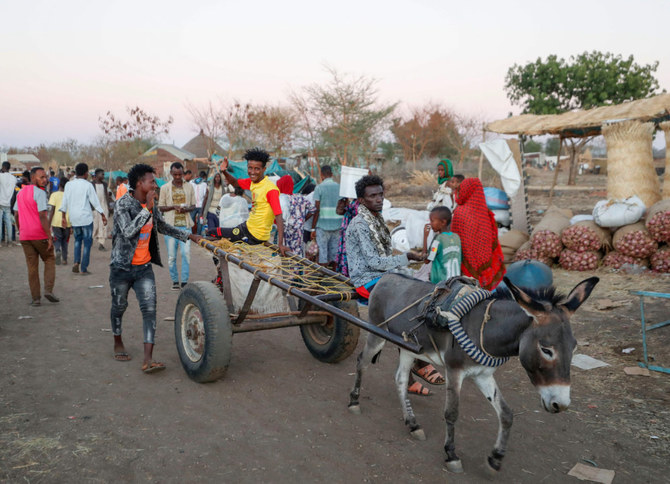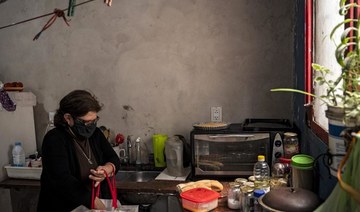NEW YORK: For the first time in 22 years, extreme poverty is on the rise around the world. The increase is being fueled by a pandemic that has intensified a host of social and economic ills that were already causing problems before the coronavirus emerged.
The COVID-19 crisis has highlighted and worsened the fragility of war-torn countries. It has undermined public health, contributed to mass unemployment, threatened food security, resulted in increased levels of violence against women and, in the words of Kelly Craft, the US ambassador to the UN, “reinforced or even created political and social divisions.”
The UN estimates that economic contraction caused by the pandemic is expected to push an additional 18 to 27 million people into extreme poverty in nations blighted by conflict. Worldwide, 51 million people are already internally displaced.
Armed conflicts and social, economic and environmental fragility are among the greatest hurdles to implementation of the UN’s 2030 Sustainable Development Goals (SDGs). These 17 global objectives, set in 2015, are designed to help eradicate poverty in all its forms and improve lives of all the peoples of the world.
With less than 10 years left to achieve the goals, Tunisia, which holds the presidency of the UN Security Council this month, organized a high-level virtual debate on Wednesday to examine and discuss the challenges that face efforts to maintain peace and security in war-torn or otherwise-fragile countries.
The debate underscored the link between fragility and conflict, with “transboundary threats” such as climate change, terrorism, organized crime and the rapid increase in numbers of armed groups continuing to contribute to instability. This is especially true in the Horn of Africa and the Sahel region, which stretches from Senegal in the west to Sudan in the east.
Tunisian president Kais Saied, who presided over Wednesday’s debate, urged the participants to tackle the root causes of conflicts, along with the factors that exacerbate them.
These include “marginalization, exclusion, poverty, the weakening of human development and state institutions, transnational organized crime, the impact of climate change, and the threat the pandemic poses to social cohesion,” he said.
The solution, he added, lies in promoting human rights, democracy and good governance, and ensuring the inclusive participation of people from all segments of society, including women and young people.
In his opening remarks, UN Secretary-General Antonio Guterres said: “Conflicts have become more complex, fueled by greater regionalization, the proliferation of non-state armed groups, and their linkages with criminal and even terrorist interests. They last longer and become more difficult to resolve.”
Citing the Fragility and Conflict Report published by the World Bank last year, he noted that one in five residents of the Middle East and North Africa lives in close proximity to a major conflict. As a result, the number of people in dire need of humanitarian assistance has reached levels unseen since the Second World War.
The report also predicted that by 2030, two-thirds of people living in extreme poverty worldwide will reside in fragile or war-torn countries.
These trends, Guterres said, have locked many nations into a vicious circle: ongoing hostilities contribute to greater levels of poverty and institutional fragility, which in turn make societies even more fragile and vulnerable to conflict, with the result that the prospects for peace dwindle.
The connection between conflict and fragility has been particularly apparent in the Horn of Africa and the Sahel, where the situation has been exacerbated by climate change, terrorism and the proliferation of armed groups.
Nigerien President Mahamadou Issoufou — in whose country more than 100 villagers were killed by gunmen last weekend — called on Security Council members to help the region overcome its fragility, “the primary victims of which are women and children.” He added that he hopes the region will figure prominently on the council’s agenda.
US ambassador Craft said that within fragile states, “weak institutions, corruption, diminished respect for the rule of law, and authoritarianism increased the risk for violent conflict and instability and opened the doors for more cycles of political subversion and violence.”
She singled out Iran as a malign presence that aims to “weaponize instability” and use it against other states.
“Iran undermines the stability of its neighbors by using fragile state or non-state actors as proxies, contributing to protracted conflicts and complex humanitarian crises,” she said.
The participants in the debate also reiterated a call by Guterres early last year for a global ceasefire so that international efforts and resources can focus on fighting the pandemic. The call has largely been ignored.
To break the cycle of poverty and war, Guterres urged the adoption of two principles enshrined in the SDGs.
The first is interdependence, as there can be “no sustainable development without peace and no peace without sustainable development.” He added that a “holistic approach” to building and sustaining peace “with targeted and tailored investments across the humanitarian-development-peace nexus, is essential.”
The second principle is inclusion. The promotion of sustainable development, and the prevention and resolution of conflicts, requires the international community to honor a pledge “to leave no one behind,” he said.
























